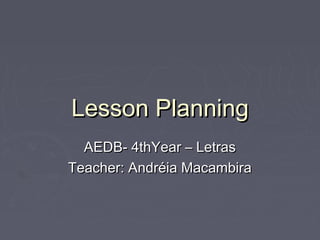
Lesson planning
- 1. Lesson Planning AEDB- 4thYear – Letras Teacher: Andréia Macambira
- 2. Planning a lesson ► Look at these metaphors. Choose one that best expresses your opinion as a teacher and the essence of a lesson.There is, of course, no right answer, but your choice will reflect your own conception. If you can find no metaphor here which suits you, invent your own.
- 3. Planning a lesson ►How can a lesson plan help the teacher in the classroom? ►What information should a lesson plan contain? Why?
- 4. Planning a lesson ►How can a lesson plan help the teacher in the classroom? ►What information should a lesson plan contain? Why?
- 5. Lesson Preparation ► How long before a specific lesson should you prepare it? ► Do you write down lesson notes to guide you? Or do you rely on a lesson format provided by another teacher, the coursebook, or a Teacher’s book? ► If so, are these notes brief (a single page or less) or long (more than one page)?
- 6. Lesson Preparation ►What do they consist of? ►Do you note down your own objectives? ►Do you actually look at your notes during the lesson? If so, rarely? Occasionally? Frenquently? ►What do you do with your lesson notes after the lesson?
- 7. Presenting and Practising Language ► Aspects to bear in mind: ► Form: written / spoken ► Meaning ► Use ► Potential problems ► Sts’ age / Sts’ level / Sts’ expectations ► Learner’s styles ► Group attitude
- 8. Stages when presenting and practising language ►Creating context; ►Isolating target language; ►Concept work; ►Checking understanding; ►Provide practice ►Debriefing; ►Production
- 9. Effective presentation ► Attention - learners alert/ attetion on the teacher / material / aware sth is coming they need to take in. Make sure learners are attending! ► Perception – learners see /hear target language clearly, make sts repeat to reinforce, to perceive. Get some response from sts – check if they have perceived the material accurately – repetition / writing
- 10. Effective presentation ► Understanding: Learners understand and link with other things they already know. T. needs to illustrate, make links with previoulsy learnt material. Feedback: a restatement of concepts in sts’ own words. ► Short-term memory: Sts need to take the material into short-term memory. More impact the original presentation has – colourful, dramatic, unsual the better. Don’t forget the learner’s style though!
- 11. THE ENGLISH LANGUAGE SCHOOL – YOUNG GROUP – LESSON 9 – UNIT 2 AIMS: Grammar Lexis Phonology Skills •To enable Sts to discuss and write about ways of improving schools and schooling, thinking about learning alternatives •In order to and So that to introduce a reason or purpose to do sth (recycling) •Should / shouldn’t & ought to (recycling) •Related to schooling: examination; grades; vocational school, field trip; continuing education •Word stress: vo’cational / con’tinuing education / exami’nation / inde’pedent •Pronunciation: schedule •Reading: an article on technology in schools; •Speaking: Discussion and problem solving activity - how to improve schools •Writing: A text – School magazine article about education in Brazil (giving opinion about schooling)
- 12. Procedures 1. (T-Sts) Correct HW 2. (T-Sts) Show slide 1 and do the matching. Show slides 2 &3 and elicit the meaning of the verb collocations, pointing out the pictures. •(T-Sts) Elicit from Sts the appropriate collocations; •As a follow up, use some of the expressions/ pictures in the last part of the PPT presentation and ask Sts to form sentences orally. ( As Sts produce sentences, T encourages them to use so that / in order to eg: I have to follow a schedule so that I don’t miss extra lessons) Monitor their production Materials Timing WB p.11 ex.3;4 PPT presentation 5’ 10’
- 13. Lesson Plan ► AIMS / General aim(s) / Specific aim(s) ► Syllabus: Grammar / Lexis / Phonology / skill work( reading / listening / writing / speaking) ► Procedures / methodology ► Resources ► Debriefing / feedback / evaluation
